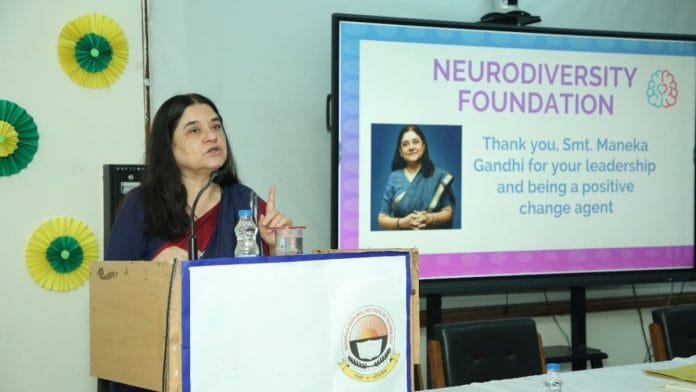New Delhi: In 1999, former Prime Minister Atal Bihari Vajpayee questioned Maneka Gandhi’s choice of portfolio as she was inducted into his cabinet. She had the option to choose from high profile ministries but picked the social justice and empowerment ministry.
“Chhii, isme to kuch bhi nahi hai (There’s nothing in it),” Gandhi recalled Vajpayee’s reaction, adding that “Atal ji meant to say this is not sexy and it won’t get you that many headlines.”
“But I held my ground there and said mujhe yeh hi chahiye (I want this only),” recalled Gandhi, Founder of People for Animals (PFA) and a former BJP MP, while receiving the inaugural Neuro Inclusive Politician Award at the Maharaja Surajmal Institute of Technology in Delhi for her pioneering leadership in advancing the rights of neurodivergent communities.
The Netherlands-based Neurodiversity Foundation—a global non-profit organisation dedicated to fostering neuro-inclusion through advocacy, education, and transformative projects—felicitated Gandhi in the presence of psychiatrist RP Beniwal, senior research scientist Triptish Bhatia, assistant professor Supreet Bhasin, retired IPS officer Karnal Singh, Neurodiversity Foundation’s India Project Lead Sachi Kaur, and Maharaja Surajmal Institute’s chairman Kaptan Singh.
Beniwal, Bhatia and Bhasin gave a detailed presentation about the prevalence of neurodevelopmental disorders and associated mental health issues in India.
Months after becoming a minister in the Vajpayee cabinet, Gandhi introduced and shaped the National Trust for Welfare of Persons with Autism, Cerebral Palsy, Mental Retardation, and Multiple Disabilities Act – a pivotal step in securing rights for neurodivergent individuals in India.
“A law at that time was new in its scope and imagination. For the first time, India formally recognised the lifelong needs of individuals with developmental and intellectual disabilities, not merely as patients or dependents, but as citizens entitled to dignity, care, protection and opportunity. It was not enough to speak of inclusion, we had to build it,” Gandhi said.
According to Gandhi, her whole life has been devoted to either “bringing power or giving power”, as feeling a lack of it is “the most miserable thing”. Everyone feels it all the time, she said – from battered wives to children in broken homes and animals.
“It (the award) is not just a recognition of past effort, it is a call to continue to persist and to believe in a better and gentle world, a world with more kindness.”
‘Moment of moral clarity’
The 1999 National Trust Bill was in Maneka Gandhi’s hand in Parliament, and it marked a definitive legislative moment for her.
“It was a moment of moral clarity. We were laying the foundation for a future in which families would no longer feel abandoned, where adults with disabilities would not disappear or vanish into invisibility, and where the state would not merely observe but act,” she recalled.
Sachi Kaur called it a truly first-of-its-kind law, moving beyond physical disabilities that had been covered under earlier Acts.
“Maneka Gandhi’s work didn’t just create policies, it declared that neurodivergent lives matter, belong, and deserve dignity. Her work through the National Trust gives families of neurodivergent individuals hope – because it proves change is possible when leaders choose to see and value neurodivergent minds,” she said.
For Gandhi, inclusion isn’t just about making room; it is about recognising that the room already belongs to everybody.
“I believe it is not charity, it is equity, and this is what really is the source of my energy and determination,” she said, adding that “neurodiversity is not a challenge to be managed but a strength to be celebrated.”
Gandhi has devoted her entire life to beings who have nothing except life – no power, and no ability to shape their own lives. “I believe that this is the reason why I was put here on earth. The universe gives one power as a test.”
Compassion and empathy form the bedrock of Maneka Gandhi’s activism and leadership.
“It doesn’t matter whether you are rich or poor, whether you are able or differently abled. Each one of us can carry a hell within us. And we need to work with each other’s hells.”
(Edited by Zoya Bhatti)






